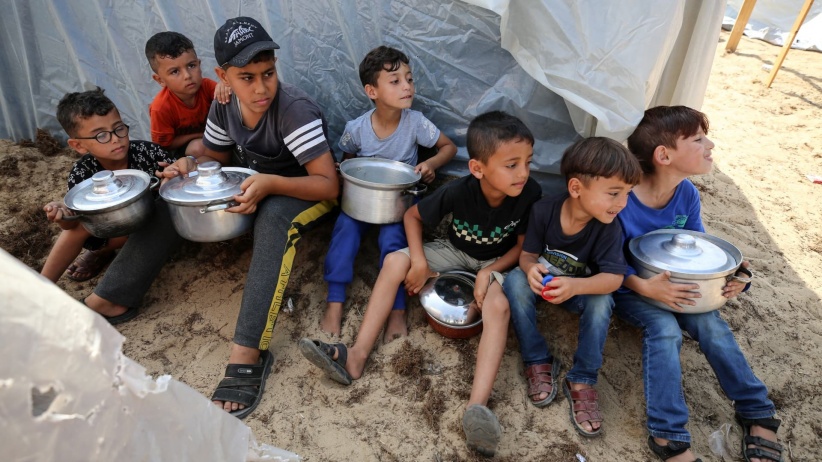
In the two months since Israel began bombarding and laying total siege to Gaza, around 85%of the 2.3 million people who live in the coastal enclave have been displaced from their homes, according to the UN. More than 17,000 people have been killed—around 70% of them women and children—and many others are missing and presumed to be trapped under the rubble of destroyed buildings, according to the Gaza Health Ministry; the enclave’s healthcare system is barely functional; and a rapid food security assessment found that nearly everyone now goes to bed hungry, and most have gone entire days without food. An Israeli ground invasion, which began Oct. 27 and is expanding into southern Gaza, is squeezing hundreds of thousands of displaced into smaller and smaller areas. Humanitarian relief efforts in Gaza have essentially ground to a halt, and UN officials have repeatedly warned that nowhere is safe. Amid these extreme conditions, “civil order is breaking down,” the Gaza director of the UN’s agency for Palestinian refugees, UNRWA, warned, while Philippe Lazzarini, UNRWA’s commissioner-general, said: “We are reaching the point of no return.”
From The New Humanitarian, Dec. 8 (condensed)
Accusations of war crimes and even genocide continue to mount against Israel.
Photo: Maan News Agency





US vetoes Gaza ceasefire resolution at UN
The United States vetoed a resolution at the United Nations Security Council Dec. 8 demanding an immediate ceasefire in Gaza.
The resolution, introduced by the United Arab Emirates, was a priority for Security General Antonio Guterres, who invoked Article 99 of the UN Charter to bring the issue to the immediate attention of the Security Council. Guterres had urged member states to demand a ceasefire, citing the “severe risk of collapse of the humanitarian system in Gaza.”
The resolution was supported by 13 out of the 15 members of the Security Council. The US, which holds veto power as a permanent member, voted against the resolution. The United Kingdom, another permanent member, abstained. (Politico, The Hill)
Article 99 is extremely rarely used. The last time it was invoked was during the 1971 war that led to the creation of Bangladesh and its separation from Pakistan. (AP)
Palestinian poet Refaat Alareer killed in Gaza
Celebrated Palestinian poet and academic Refaat Alareer was killed in an air-strike at his home in Gaza City Dec. 8. Three days earlier, an air-strike northeast of Gaza City killed prominent Palestinian scientist Sufyan Tayeh and his family, the Palestinian Higher Education ministry announced. Tayeh, president of the Islamic University of Gaza, was a leading researcher in physics and applied mathematics. (The Guardian, Reuters)
Amnesty: US-made bombs used in civilian airstrike in Gaza
Following an investigation, Amnesty International found Dec. 5 that the Israeli military used US-made Joint Direct Attack Munitions (JDAM) to commit war crimes in Gaza. Amnesty states that it found “distinctive fragments of the munition in the rubble of destroyed homes in central Gaza.” The organization asserts that the Israeli military used JDAMs in two strikes that killed 43 civilians. (Jurist)
Israel court resumes Netanyahu corruption trial
Israeli prosecutors resumed the corruption trial of Israeli Prime Minister Benjamin Netanyahu after Israeli Minister of Justice Yaris Levin lifted the country’s state of emergency on December 1. The trial had been on hold since Sept. 20, when the courts adjourned for Rosh Hashanah. The trial was then again postponed due to the ongoing Israel-Hamas war. (Jurist)
Israel used US-made white phosphorus munitions in Lebanon
The Washington Post revealed in an exclusive published Dec. 11 that it had uncovered credible evidence that the white phosphorus munitions, which can cause severe burns to human skin and respiratory tracts, used by Israel in an October attack on Dheira, Lebanon, were manufactured in the US. (Jurist)
Gaza: General Assembly calls for immediate ‘humanitarian truce’
The US General Assembly Dec. 12 adopted a major resolution calling for an “immediate, durable and sustained humanitarian truce leading to a cessation of hostilities” in Gaza. Proposed by Jordan, the resolution won the support of 153 nations, while 10 voted against and 23 abstained. It was a rebuke to the United States which has repeatedly blocked ceasefire calls in the UN’s Security Council. (UN News, CNN)
The member states that voted against the resolution were the US, Israel, Austria, Czechia, Guatemala, Liberia, Micronesia, Nauru, Papua New Guinea and Paraguay. Among those who abstained were the UK, Germany, Hungary, Italy, Argentina, Malawi, the Netherlands, Ukraine, South Sudan and Uruguay. (Jurist)